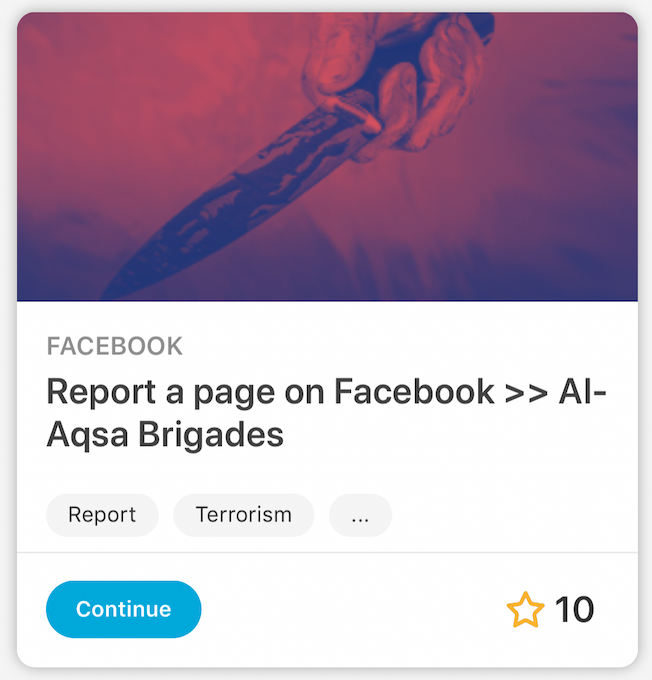Call of Duty
An app called Act.IL has adapted IDF communications strategy into a massive multiplayer online game.

THIS YEAR ON Nakba Day, the annual May 15 commemoration of the mass displacement of Palestinians during the establishment of the State of Israel, Palestinians gathered on the internet to remember their history and to remind the global public of their struggle. Unable to meet in person due to Covid-19, activists arranged virtual reality tours of Gaza and the West Bank, shared personal and family stories, and promoted hashtags to mark a historic trauma and its present ramifications.
The same day, a special mission appeared on the app and Facebook page of the online platform Act.IL, directing users to download a set of images and memes—already cropped into Instagram-ready squares—and then share them on social media under the hashtag #KeyToPeace. Designed to disrupt and delegitimize the observance of Nakba Day, the memes were replete with racist and violent imagery of Palestinians: pictures of suited men transforming into terrorists, photos of children dressed in camo and war paint. Hundreds of these images soon appeared online, posted and shared by everyday users as well as prominent right-wing pro-Israel activists like Israeli-American Council co-founder Adam Milstein.

Israeli officials, wealthy megadonors, and Zionist activists increasingly speak of an “online battle for Israel,” and this language of war is not merely a figure of speech. As it has moved online, hasbara—the Hebrew term for Israeli propaganda pitched to foreign audiences, a key part of Zionist advocacy for decades—has come to include cyber initiatives that work closely in concert with Israel’s military. Perhaps the most ambitious of these initiatives is Act.IL, an app that has adapted IDF communications strategy into something like a massively multiplayer online game.
Launched in 2017, Act.IL sends activists on “missions” to like, comment, and share pro-Israel material on social media, and to flag, report, and respond to Israel’s online critics. Users jump from platform to platform, countering criticism of Israel with talking points and images that reflect a right-wing Zionist understanding of Jewish and Israeli history, culture, and politics. The app encourages Israel supporters—and particularly Jewish Americans—to imagine themselves as soldiers fighting for Israel on the front lines of a vicious cyber war. In doing so, these supporters form a network with Israel’s actual soldiers: The app’s CEO, Yarden Ben Yosef, is a longtime Israeli intelligence officer who told The Forward in 2017 that Act.IL’s developers work closely, if informally, with Israeli military and intelligence officials. The app’s enthusiastic gamifaction of propaganda and its slick startup veneer mask the direct extension of Israeli militarism and surveillance into diaspora Jewish communal life.
Act.IL emerged from the Interdisciplinary Center (IDC), Israel’s first private university, which is located in the city of Herzliya at the heart of the country’s high-tech “Silicon Wadi” and has deep ties to the Israeli military and state apparatuses. During Israel’s 2012 incursion into Gaza, the IDC established an emergency “public diplomacy center” to address concerns about the country’s image; the center was revived two years later, when the IDF killed thousands of Gazans during another military operation.
During both campaigns, Israel’s military overpowered Gaza on the ground. Yet despite these victories, IDC leadership—which includes former military generals, intelligence officers, and heads of state—continued to worry about Israel’s reputation online, where eyewitness testimonies and videos by Palestinians and visiting journalists challenged the state’s official narrative. To stem the tide of online criticism, IDC students, with the support of the Ministry of Diaspora Affairs and other state agencies, set up a “situation room” where, according to a campus magazine, volunteers worked around the clock, scanning headlines, posting comments, and responding to messages circulating on social media.
The IDC quickly established the situation room as a permanent fixture of the university. With the help of US-based pro-Israel organizations and software developers, it also began exporting this aggressive communications model to Jewish communities in the diaspora. Today, community managers and volunteers meet regularly in media rooms around the United States (or, these days, virtually) and trawl the internet for posts they deem anti-Israel, which they feed into the back end of Act.IL. These messages then become the basis for a sprawling online game.
WHEN A NEW user wants to become a hasbara soldier, they create an account on the app and undergo a training regimen, with encouragement from a YouTube narrator who explains how the app can help “upgrade your activism.” The app then offers a series of missions to complete. Tapping a mission brings the user to a briefing, where they are presented with a short description and screenshot of the target—a social media post—and guidance on how to respond. Depending on the nature of the mission, this might mean writing a hostile comment or flagging a post as inappropriate, or it might mean sharing or upvoting an allied post. (Act.IL provides participants with talking points, but also encourages them to develop their own language lest they be marked as bots by social media platforms.) The user is then brought directly to the platform where the target appears, and carries out the operation. Finally, they can jump back to the Act.IL app to earn their reward. Users receive points for each completed mission, unlock badges for achieving certain objectives, and are ranked on leaderboards that display the top activists in a given month.
Missions vary wildly in tone. Many try to tap into Israel’s preferred image as a cultural haven and technological powerhouse. Last spring, for instance, some missions asked users to comment on Madonna’s Eurovision Song Contest performance to combat “culture hijackers” using the supposedly apolitical event as an opportunity to attack Israel. Others directed users to comment on the (failed) Beresheet moon landing and marvel at how “Israel, despite its size, can still make astronomical achievements.” One mission sent users to rally around a fashion influencer on Instagram who was criticized for traveling to Israel. While some missions seek to distance culture from politics, others are explicitly political, asking users, for instance, to sign a petition in which criticism of Israel is condemned as antisemitic. Still other missions plead for users to report videos on Instagram or Facebook that supposedly “incite and glorify terrorism,” even if the offending content is a provocative music video set to a political song from the 1970s that doesn’t advocate violence.
Each mission is accompanied by a title card that fits the hyperbolic language of Act.IL’s directives. While cultural missions tend to have a positive slant, with heart-filled pink and purple title cards, many missions feature explicitly racist language and violent imagery. These cards feature depersonalized, closely cropped, angry-red photos of anonymous Arab males wearing keffiyehs, throwing stones, setting fires, and rioting. One mission asking users to like a Twitter comment responding to an article from the Reuters news service—“The vast majority of Gazan deaths were terrorists”—has a card that shows the head and hand of a keffiyeh-clad youth ready to launch a stone. Another card shows just a hand holding a knife dripping with blood, an allusion to a spate of stabbings committed against Israelis in 2015–2016.

One defining feature of the Act.IL network is its “no-logo policy,” an explicit practice of removing sources and context from publicly shared images and documents. As the Act.IL website and promotional documents explain, the no-logo policy is designed to persuade people who don’t already have strong opinions about Israel: It functions as a kind of anti-brand, making ideological statements appear neutral and organic. Context highlights the subjectivity of political rhetoric; Act.IL aims to wash context away, and thus portray particular right-wing Zionist views as obvious or indisputable.
In keeping with this strategy, Act.IL’s website presents the app as a grassroots, crowdsourced initiative fueled by “the power of communities,” although in reality it is very much a top-down production. The IDC commissioned the platform in conjunction with two well-funded, US-based pro-Israel groups, the Israeli-American Council (IAC) and the Maccabee Task Force. The former is a cultural organization devoted to Israeli-American advocacy and has a lobbying arm that pushes anti-BDS legislation and hawkish foreign policy positions. The latter, funded by Sheldon Adelson and directed by Christian Zionist David Brog, is devoted to combating BDS on college campuses.
Act.IL was developed by Rallyware, an employee productivity software firm whose customers include Avon and Samsung, and its interface closely resembles a gamified employee training and surveillance tool. The app’s human resources aesthetic and management style are reflected, too, in the media rooms that pump data into Act.IL: Website administrators recruit high school and college students to become volunteer mission coordinators with the promise that they will be coached and mentored by professional digital and social media managers. LinkedIn searches for many of the activists topping the mission leaderboards show that media room volunteers and paid staff tend to top the charts, rather than the 22,000 grassroots users the network boasts about.
Act.IL has had some tangible successes. When students at Pitzer College in southern California pushed the school to drop its Israel study-abroad option, the network organized a campaign with a widely shared petition, a video featuring student interviews, and missions directing users to contact the school and register complaints. While the vote to drop the program was passed by the student government, it was vetoed by the college president, whose explanation borrowed language from points found in Act.IL’s petition. The online network also claimed to have been instrumental in delaying the implementation of a new ethnic studies curriculum for California high schools by creating numerous missions encouraging users to argue that the curriculum was antisemitic and that it marginalized Jewish students.
The app’s full user base can be difficult to mobilize: In May 2019, Act.IL directed its users to an “emergency” webpage of specific missions designed to defend Israel when the military opened fire on protestors participating in Gaza’s Great March of Return. But an analysis by the Atlantic Council’s Digital Forensic Research Lab found that the page it advertised received only about 300 visits: 56% from the US, 36% from Israel, and 8% from Russia.
Intensity, however, can make up for lack of breadth. Act.IL’s band of committed users—including the young people recruited by the site to learn online attack tactics—increases the likelihood that any online criticism of Israel, no matter how innocuous or accurate, will result in pushback. The rapid expansion of the app, coupled with Israel’s eagerness to sell its high-tech security technologies and strategies to other countries, suggests that these efforts reflect a vision for the future of right-wing propaganda and online activism. Success for Act.IL, then, is not about going viral or reaching a critical mass, but about creating a standing army of trolls always ready to take up arms in Israel’s cyber war.
Daniel Lark is a PhD student in cinema and media studies at the University of Southern California.